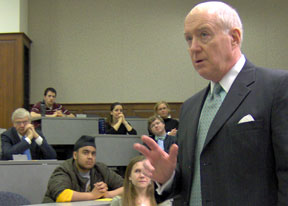Federal Judge Henry E. Hudson Describes Path to Public Service

The Honorable Henry E. Hudson described his path to public service in the second George Wythe Society Lecture at the Law School on Wednesday, April 9. Best known for having recently presided over the trial of Michael Vick, Hudson spoke to students, faculty members and administrators about the citizen lawyer's "duty to change things, to do things that leave your community better than you found it."
"You are going to find as you progress in your career that you wonder whether you have the sense of self-fulfillment that you had when you started out as a lawyer," Hudson said. "It is a very soul-searching question - many people don't think about their legacy until they reach the sunset and then it's too late to do anything about it."
Hudson, whose son is a first-year law student, was invited by the George Wythe Society of Citizen Lawyers to speak at the Law School about his experiences as a deputy sheriff studying law by night, as the Commonwealth's Attorney for Arlington County, as the United States Attorney for the Eastern District of Virginia, and as a federal judge. Former President Gene Nichol delivered the first George Wythe Society Lecture last fall.
Introduced by Interim President Taylor Reveley, Hudson opened his remarks by advising students "to be very, very cautious in choosing your goals as a lawyer." He emphasized that "everybody here has their own vision of what success is, but you will find that success has a lot of moving parts to it." Success, he said, hinges not on the size of a lawyer's paycheck but on a lawyer's "personal happiness and fulfillment."
Entering public service by "happenstance," Hudson worked his way through law school at American University, taking courses by night and arresting criminals by day as a deputy. A native of Arlington County, Hudson said he soon realized that "being a cop is great, but the person who really puts the case together is the prosecutor."
Hudson won the 1979 election for Commonwealth's Attorney in Arlington County with 60 percent of the votes and was re-elected in 1983. Three years later, former President Ronald Reagan personally asked Hudson to lead a pornography commission and subsequently appointed him U.S. Attorney for the Eastern District of Virginia.
"When the President of the United States calls, what can you say?" Hudson joked. "You don't say 'yes,' you say 'yes sir!'"
Hudson only mentioned the Michael Vick case once in his hour-long lecture, and then only in passing. "[If] you think the Michael Vick case is high publicity, you ain't seen nothing compared to the pornography commission," he said.
Tipping his hat to the favorable press coverage toward the outcome of the Michael Vick case, Hudson acknowledged that the publicity drawn by a high profile arrest, prosecution, or trial can be rather exciting. He said that the "pleasure you get in having [newspaper editorial writers] commend you is a pleasure few people in the private sector have ever had."
Toward the end of Hudson's often humorous delineation of his path from deputy sheriff to prosecutor to judge, the federal judge reflected on the state of the criminal justice system today.
"Sometimes we're too quick on the trigger," he said. "I think sometimes, zero-tolerance ... does a disservice to young people. I think too many young people are arrested for petty offenses that can better be handled at home."
Hudson ended his lecture on a high note, however, encouraging students to develop their professional networks, their lists of people to call upon later in life for professional assistance.
"As you progress in the course of your careers, maintain a rolodex," Hudson advised. "You will find that your networks, your contacts of people, are the biggest assets you will ever have."